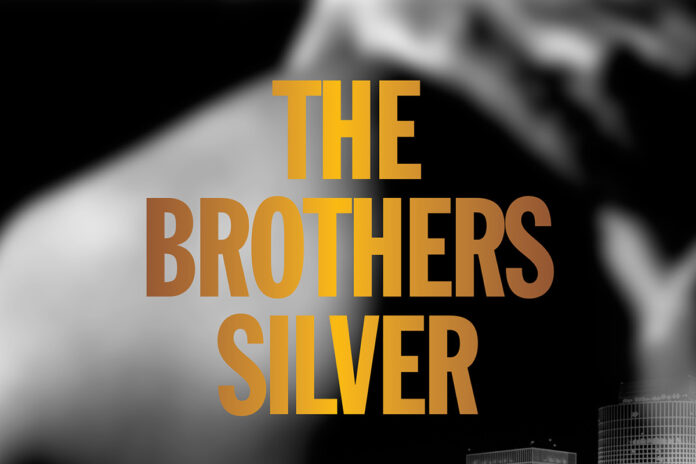Book Review by Violet Snow
About the Novel: Jules and Leon Silver sit at a dusty Formica table in a cold kitchen, drinking warm sugar water. Downstairs in the basement, their mother is unconscious, having swallowed hundreds of Librium while the brothers were at Boy Scout camp, her latest suicide attempt. The food cupboards are empty. The phone doesn’t give a dial tone. As the sun goes down, the kitchen grows cold. The boys sit in silence, waiting for their mother to die. She doesn’t, but the guilt and anger they feel haunt the brothers for decades. The Brothers Silver follows Jules and Leon as they try to find their unanchored way through the cultural upheavals of the second half of the 20th century. The younger Leon lives on the drug-addled edges of society. The older brother, Jules, falls into a destructive relationship that parallels his past insecurities and chaos. What lies in store for the Silver brothers? Recovery or turmoil?
**
A mother who repeatedly attempts suicide, freely blaming her sons for her misery. A father who is more devoted to having affairs and gambling on the ponies than spending time with his family. Can children survive such parents and go on to to have functional lives? In The Brothers Silver, poet Marc Jampole experiments with the novel form while describing the adventures of two boys who emerge from their traumatic youth and take divergent paths into adulthood.
The brilliant younger brother, Leon, is the favorite of his parents. They still take out their frustrations on him, but the older brother, Jules is jealous of their undisguised preference for Leon. They both emerge from childhood imbued with cynicism and self-indulgence. Although the guilt-wracked Jules is the point-of-view character, somehow he comes off as less sympathetic than his brother, who is determined to live in the moment, assisted by drugs and with a minimal sense of responsibility. He doesn’t seem any happier than the aimless Jules, who wanders through life doing whatever seems easiest, while berating himself for not doing more.
Although the brothers are both troubled and selfish, they do not become abusers like their parents. Jules is drawn irresistibly to unlikeable people, as if unconsciously trying to work out his relationship with his parents through interactions with psychotic friends and vicious lovers. He has a tortured intimacy with El, a woman who is as manipulative as his parents were; however, although he’s subject to fits of anger, he doesn’t treat her nearly as badly as his father treated his mother. He eventually gets wise and leaves her, winding up in a placid marriage, working a white-collar job, and fathering a daughter we don’t get to know, although she seems pretty okay. Check off a plus for Jules, for not victimizing his own kid, even though he himself was a victim.
Jampole tinkers with the novel form, employing an array of styles and viewpoints that meet with varying success. Each of the main characters gets a chapter or two in their own voice, but Jules owns the bulk of the narration, beginning with a childhood overview written in a poetic style scattered with rhymes.
I found myself preoccupied with the rhymes through much of the first chapter. I would hold my breath, waiting for the pairs to emerge:
The kitchen seems familiar and strange at the same time, as if under a tinselly, chintzy spell—cleaner than it has been in weeks, free of worry, full of the luscious smell of blintzes and Mario Lanza singing “The Student Prince.”
I don’t suppose anyone has ever rhymed “chintzy,” “blintzes,” and “prince” in the same sentence.
The question is, do I want to be so distracted by the rhymes that it’s hard to concentrate on the story? It’s true that there’s a touch of exhilaration to Jampole’s rhymes, especially when they’re unexpected. They pull the reader along on rippling sounds that combine in scintillating ways. But it’s jarring when one comes along that goes splat:
“Are you out of your mind, of course it’s my business.”
“I won’t take pressure, no duress.”
But I’ll accept that Jampole is playing with words while telling a story. He seems to be more interested in sound than in strictly reproducing voice, as long as the truth comes through.
By the time I hit page 24, I’d stopped grasping for the rhymes and learned to ride them. Rhyming became a tide, washing in and out, carrying me along as Jules washed on the tide of his mother’s insanity, his father’s spasmodic neglect.
I applaud Jampole for his experimentation, even if I couldn’t always appreciate it.
The second half of the book describes a road trip Jules takes in his sixties, looking up people he met on a youthful hitchhiking odyssey. In each encounter, he is appalled to find the wild idealism, rebellion, and/or hedonism of the ’70s has deteriorated into a conservative, exploitative lifestyle. The tattoo artist now traffics in illegal immigrants. The frat-boy drug dealer is buying a seat in Congress.
This journey appears to serve three purposes in the novel. Jules’s visits with past comrades bemoan the loss of idealism in the world that the U.S. has become, making a political and moral statement that seems to belong in a separate book. Between these many little morality tales, he meditates on his relationship with Leon and recalls his disastrous relationship with El. Presumably, the often hallucinatory memories, evoked by long nights on the road, have a therapeutic effect on Jules. They also fill in gaps in the story for the reader’s benefit.
I suppose the whole chapter is witness to the person he has become as a result of his upbringing, but the thread to the morality tales is tenuous. However, the start of the book and the second half are linked by Jampole’s return to the poetic style.
As in the first chapter, the non-linear chronology requires a go-with-the-flow attitude on the part of the reader, to match the rambling poetic phrasing:
I imagine an ancient tree, as gnarled and knotted as my brain-constipating thoughts beside a rotting bridge of selves transforming into future selves, all wallowing in praise and blame, pleasure, pain, loss and gain, ups and downs, while El seems to slide from lotus leaf to lotus leaf down the shallow river to a waiting tiger, which she rides to a distant town.
To pass the time while driving alone, Jules makes lists: the differences between himself and Leon, the many women he’s had sex with, the ones he didn’t have sex with, ways one can change, ways to prepare for death, ways El drove him crazy ‒ this last list confirming he really was dealing with his mother:
She falsified my meanings, turning yes into no, fast into slow. Her dramatic preening ‒ her brawling, burning, Gothic mistrals ‒ sounded like my mother’s shtick, if my mother had studied forties flicks.
Finally, Jules heads home to New York, his lists replaced by disturbing familial memories, in kaleidoscopic sequence. By the time he arrives, he has abandoned the past and come to rest in the present:
A muggy ocean breeze teases with its wheezes. It glides between the buildings, reminding me the seas are near. It fills the streets with sticky nuzzles and the puzzle of the clouds….
And we can all take a deep, cleansing breath. The Brothers Silver requires patience and persistence, but an adventurous reader will find much to entertain and provoke.
About the Author
Marc Jampole wrote Music from Words (Bellday Books, 2007) and Cubist States of Mind/Not the Cruelest Month (Poet’s Haven Press, 2017). His poems and short stories have appeared in many journals and anthologies. About 1,800 freelance articles written by him have also been published. A former television reporter and public relations executive, Marc writes the OpEdge blog, which has regularly appeared on the websites of three national publications. He is the immediate past president of the board of Jewish Currents, a national magazine of politics and arts.
About the Reviewer
Violet Snow is a freelance journalist whose articles have appeared in the New York Times “Disunion” blog, Civil War Times, American Ancestors, The Sun Magazine, Jewish Currents, and numerous other periodicals. Woodstock Times has published her reviews of books and films.















